
Asia-Pacific Economic Cooperation is an inter-governmental forum for 21 member economies in the Pacific Rim that promotes free trade throughout the Asia-Pacific region. Following the success of ASEAN's series of post-ministerial conferences launched in the mid-1980s, APEC started in 1989, in response to the growing interdependence of Asia-Pacific economies and the advent of regional trade blocs in other parts of the world; it aimed to establish new markets for agricultural products and raw materials beyond Europe. Headquartered in Singapore, APEC is recognized as one of the highest-level multilateral blocs and oldest forums in the Asia-Pacific region, and exerts significant global influence.

The G20 or Group of 20 is an intergovernmental forum comprising 19 sovereign countries, the European Union (EU), and the African Union (AU). It works to address major issues related to the global economy, such as international financial stability, climate change mitigation and sustainable development.

The East Asia Summit (EAS) is a regional forum held annually by leaders of, initially, 16 countries in the East Asian, Southeast Asian, South Asian and Oceanian regions, based on the ASEAN Plus Six mechanism. Membership expanded to 18 countries including Russia and the United States at the Sixth EAS in 2011. Since its establishment, ASEAN has held the central role and leadership in the forum. EAS meetings are held after the annual ASEAN leaders' meetings, and plays an important role in the regional architecture of Asia-Pacific. The first summit was held in Kuala Lumpur, Malaysia on 14 December 2005.

APEC Peru 2008 was a series of political meetings held around Peru between the 21 member economies of the Asia-Pacific Economic Cooperation during 2008. Although business leaders of the region also met before the summit officially began. Leaders from all the member countries met during November 22–23, 2008, in the capital city of Lima.
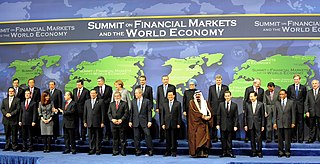
The 2008 G20 Washington Summit on Financial Markets and the World Economy took place on November 14–15, 2008, in Washington, D.C., United States. It achieved general agreement amongst the G20 on how to cooperate in key areas so as to strengthen economic growth, deal with the 2008 financial crisis, and lay the foundation for reform to avoid similar crises in the future. The Summit resulted from an initiative by the French and European Union President, Nicolas Sarkozy, Australian Prime Minister Kevin Rudd, and the British Prime Minister, Gordon Brown. In connection with the G7 finance ministers on October 11, 2008, United States President George W. Bush stated that the next meeting of the G20 would be important in finding solutions to the economic crisis. Since many economists and politicians called for a new Bretton Woods system to overhaul the world's financial structure, the meeting has sometimes been described by the media as Bretton Woods II.

The China–Japan–South Korea trilateral summit is an annual summit meeting attended by the People's Republic of China, Japan and South Korea, three major countries in East Asia and the world's second, fourth and 12th largest economies. The first summit was held during December 2008 in Fukuoka, Japan. The talks are focused on maintaining strong trilateral relations, the regional economy and disaster relief.

The 2010 G20 Seoul Summit was the fifth meeting of the G20 heads of government/heads of state, to discuss the global financial system and the world economy, which took place in Seoul, the capital of South Korea, on November 11–12, 2010. South Korea was the first non-G8 nation to host a G20 leaders' summit.

The 2014 G20 Brisbane summit was the ninth meeting of the G20 heads of government/heads of state. It was held in Brisbane, the capital city of Queensland, Australia, on 15–16 November 2014. The hosting venue was the Brisbane Convention & Exhibition Centre at South Brisbane. The event was the largest ever peacetime police operation in Australia.

The APEC Indonesia 2013 was the 25th annual gathering of APEC leaders. It was held in Bali on 5–7 October 2013. The summit also saw the revival of wearing national dress, which had been explicitly discontinued by US President Barack Obama two years prior.
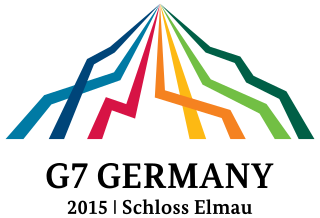
The 41st G7 summit was held in Schloss Elmau, Krün, Bavaria, Germany on 7–8 June 2015. In March 2014 the remaining members of the G8 declared that a meaningful discussion was currently not possible with Russia, and since then meetings have continued under the G7 name.
The foreign policy of the Modi government is associated with the policy initiatives made towards other states by the current government of India after Narendra Modi assumed the office of prime minister on May 26, 2014.
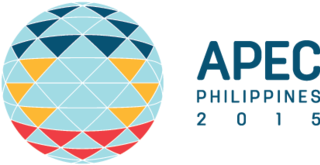
APEC Philippines 2015 was the year-long hosting of the Asia-Pacific Economic Cooperation (APEC) meetings which concluded with the APEC Economic Leaders' Meeting held on 18–19 November 2015 in Pasay, Metro Manila. It was the second time the Philippines hosted the summit, the first being in 1996.
The negotiations for the Trans-Pacific Partnership Agreement were held between 12 countries between 2008 and 2015. The negotiations were aimed at obtaining an agreement between the Trans-Pacific Strategic Economic Partnership Agreement parties Brunei, Chile, Singapore and New Zealand, as well as the Australia and the United States.

APEC Peru 2016 was the XXVIII year-long hosting of Asia-Pacific Economic Cooperation (APEC) meetings in Peru, which was culminate with the XXIV APEC Economic Leaders' Meeting in 19–20 November 2016 in Lima. It marked the second time Peru played host to the APEC, previously hosting in 2008.
APEC Philippines 1996 was a series of Asia-Pacific Economic Cooperation meetings focused on economic cooperation, held at the Subic Bay Freeport Zone in Subic, Zambales on 24–25 November 1996. It was the eighth APEC meeting in history and the first held in the Philippines.

The 2019 G20 Osaka summit was the fourteenth meeting of the G20, a forum of 19 countries and the EU that together represent most of the world economy. It was held on 28–29 June 2019 at the International Exhibition Center in Osaka. It was the first G20 summit to be hosted by Japan. The dinner and cultural event on 28 June was held at the Osaka State Guest House.

APEC China 2001 was a series of economic and political meetings between the 21 member states of the Asia-Pacific Economic Cooperation forum held in the People's Republic of China during 2001. Various meetings were held across the country, with leaders from all the member countries meeting 20–21 October 2001 in Shanghai.

APEC Mexico 2002 was a series of political meetings held around Mexico between the 21 member economies of the Asia-Pacific Economic Cooperation during 2002. Leaders from all member countries met from 26–27 October 2002 in Los Cabos. Counter-terrorism efforts were major topics on the agenda of APEC Mexico 2002. The APEC summit attempted to present a new opportunity for Asian investors and commercial agents to discover Mexico as a profitable frontier in the future.
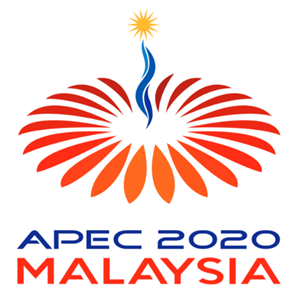
APEC Malaysia 2020 was the year-long hosting of Asia-Pacific Economic Cooperation (APEC) meetings in Malaysia from December 2019 until November 2020. Due to the COVID-19 pandemic, most of the meetings were held virtually, including the culminating Economic Leaders' Meeting.
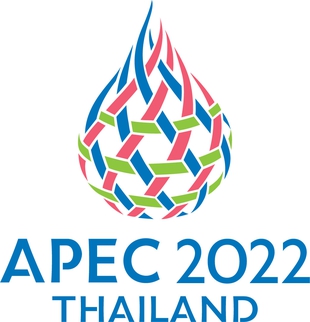
APEC 2022 Thailand is a year-long hosting of Asia-Pacific Economic Cooperation (APEC) meetings in Thailand that took place in 2022. Thailand previously hosted APEC meetings in 2003 and 1992.


















